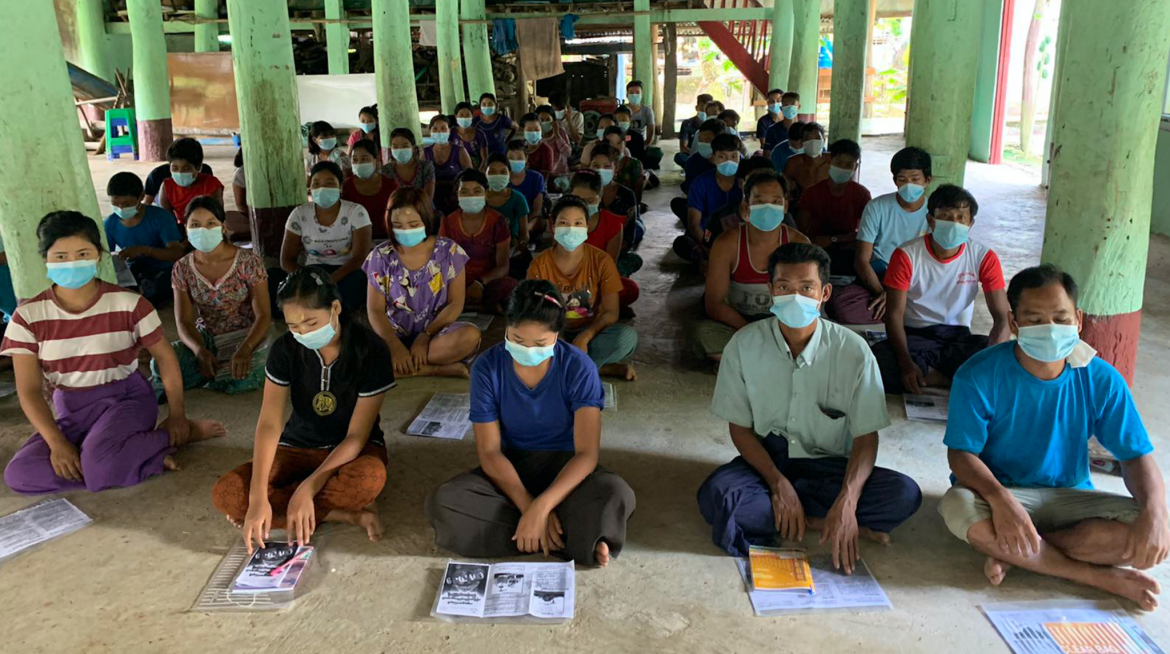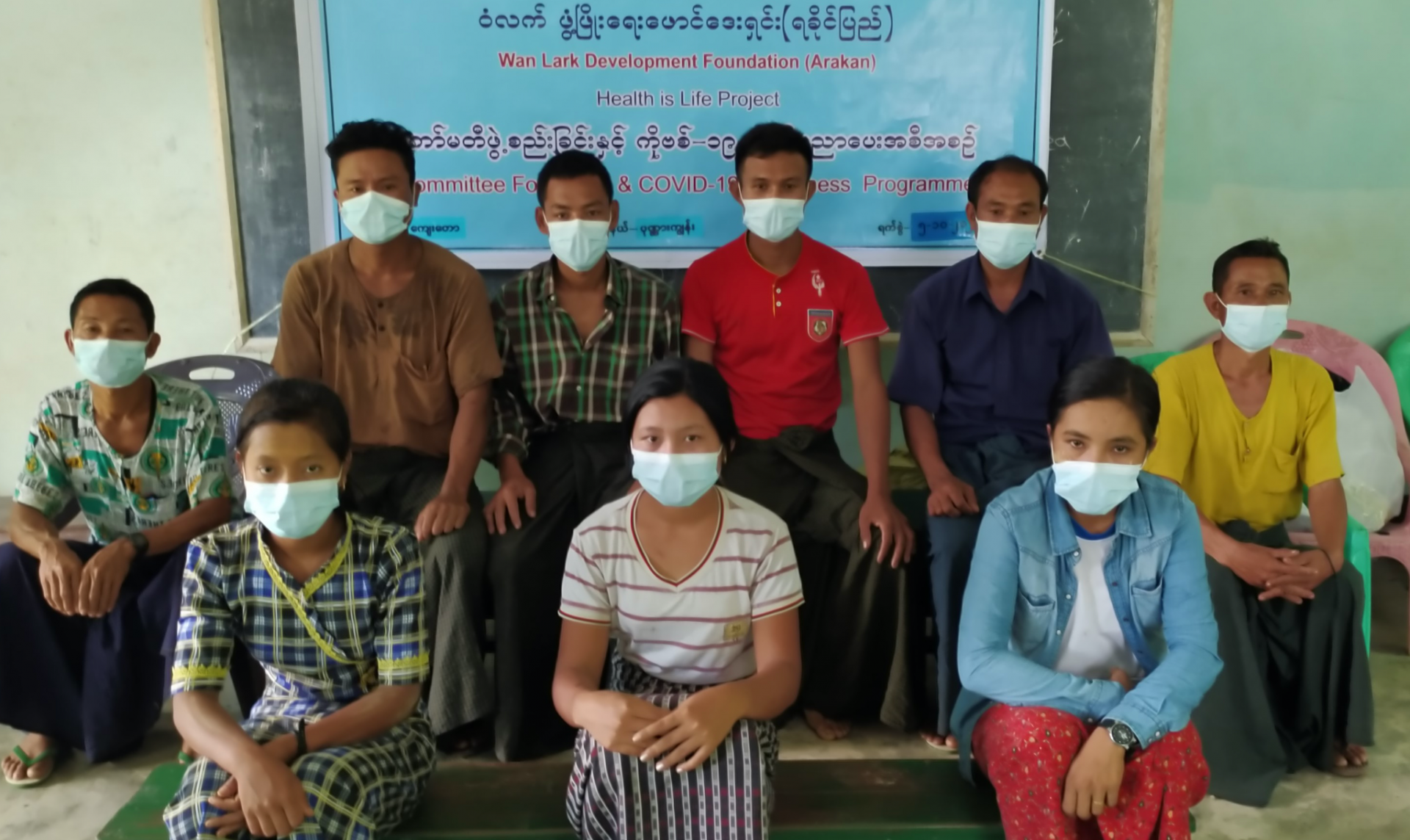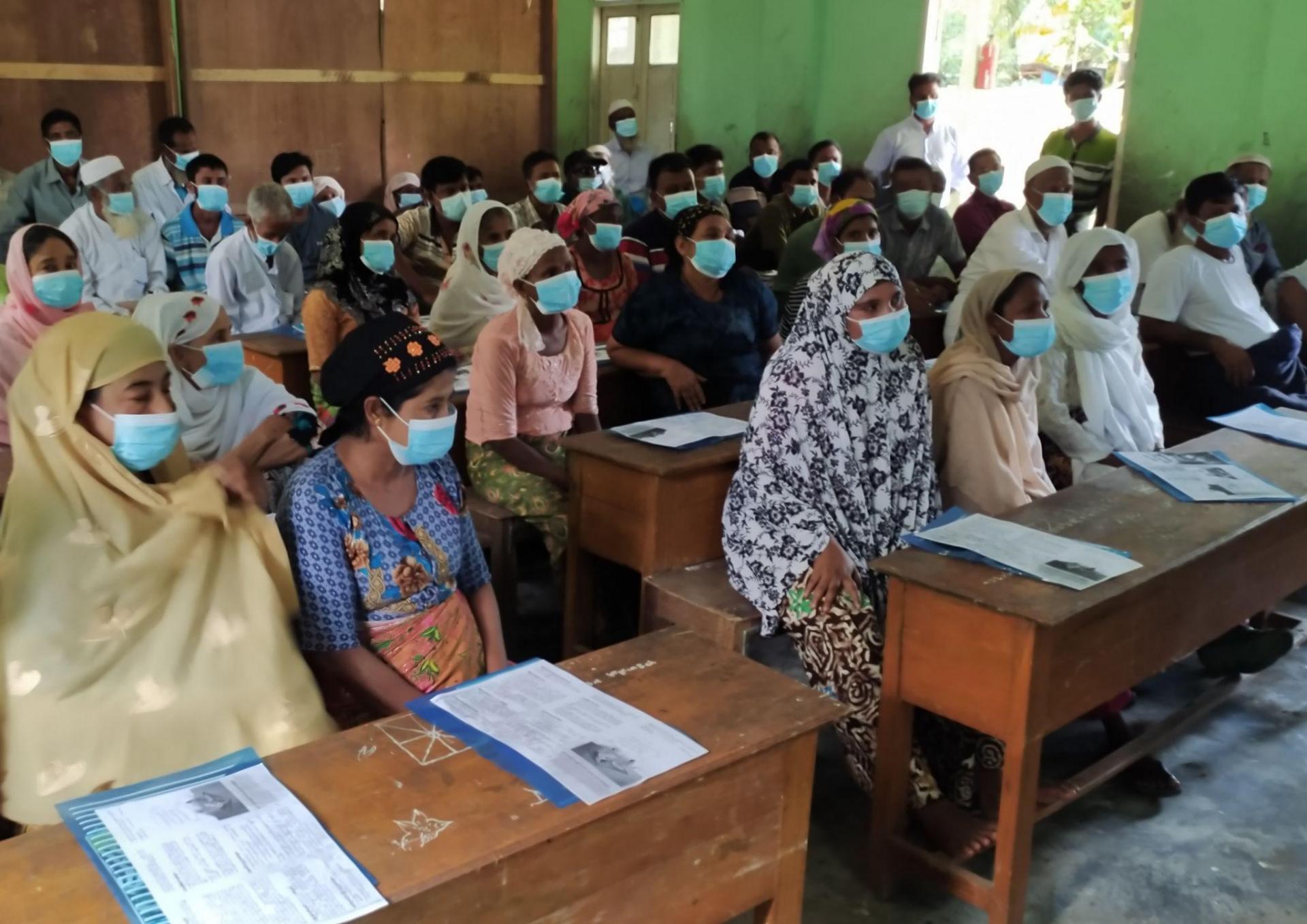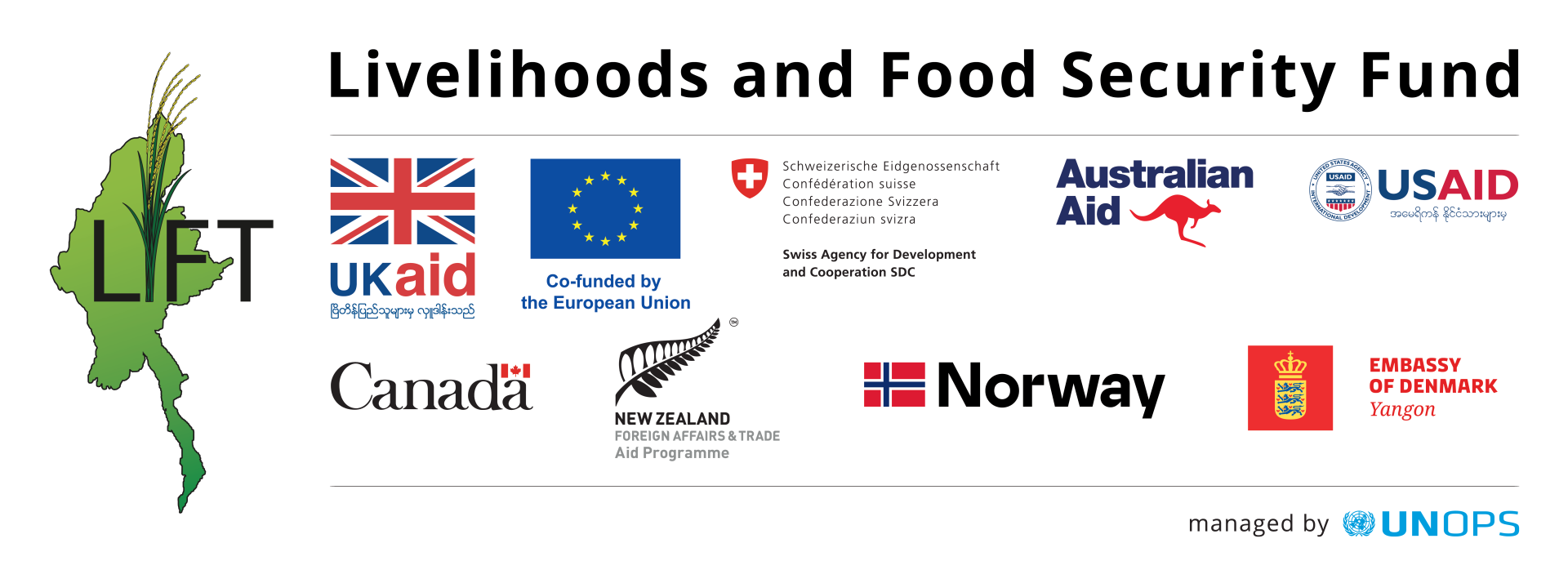
(Myanmar translation below)
The Wan Lark Foundation is one of 42 civil society organizations (CSOs) in Rakhine State which has so far received funding from LIFT through its Small Grants Fund (SGF) managed by the Metta Development Foundation. LIFT's Rakhine Communication Hub (RCH) conducted an interview with Khaing Kaung San, the Executive Director of the Wan Lark Foundation, for a project update and some further insights into working with different communities in Rakhine State.
**************
RCH:
Khaing Kaung San, could you give us a general description of the project you are running at the moment which was funded by LIFT through the Metta Development Foundation?
Khaing Kaung San:
Sure. We are implementing a project named “Health is Life'' with the support of LIFT's Small Grant Fund. The project will run for three months from September to November 2021. The main objective of this project is to implement the COVID-19 response program among rural populations. Rakhine State had a higher death toll during the third wave of the COVID-19 pandemic than in the first and second wave combined. Especially the rural population in Rakhine - with little access to information on the COVID-19 pandemic and preventive Items - was not at all ready to respond to the threat. As a result, local CSOs were trying to conduct COVID-19 awareness sessions and distribute COVID-19 preventive Items in rural areas and in IDP sites where many of the most vulnerable live. Under the name “Health is Life”, the project team of the Wan Lark Foundation is conducting COVID-19 awareness sessions and helps the formation of COVID-19 response committees in 15 villages and two IDP sites in Sittwe, Ponnagyun and Kyauktaw townships. The beneficiaries of this project are Rakhine, Muslims (Rohingya), That, Mro, Maramagyi and Thetkama living in these villages. We have 50 beneficiaries under this awareness program per village. As a result, 850 people from 15 villages and two refugee camps will directly benefit from the project.
RCH:
What is the gender ratio of the rural people participating in your project?
Khaing Kaung San:
As I said earlier, we have 50 beneficiaries per village. Out of these, the female participation rate is usually between 25% and 30%. We also calculate the number of beneficiaries based on our gender equality policy. The age limit is between 18 and 65 years old.
RCH:
How did you conduct the COVID-19 awareness sessions and forming of COVID-19 response committees?
Khaing Kaung San:
When we arrive in a village to conduct the awareness sessions, the previously invited 50 participants attend the session in a large open space since we are strictly following the official health guidelines to prevent COVID-19. Then we convey the basic COVID-19 awareness messages that everyone should know. We also have a Q&A session there so we can address questions from the participants directly and immediately. Towards the end of this section, we informed them that we would like to form a community-based COVID-19 response committee in their village. Then people who are interested in joining the committee submit their names. All committees have a total of nine members, including one leader. These committees have been set up everywhere we implement the project.
RCH:
What are the criteria for selecting members of the committees? And what is the gender ratio there?
Khaing Kaung San:
We set the basic criteria for the committee members. At least, every member must have basic education and be able to speak the Rakhine language fluently. This is because these committee members must be able to disseminate COVID-19 information to their communities promptly are not. For example, in case we tell them something important regarding the latest information about COVID-19 over the phone, they have to be able to fully understand it and pass it on to the community immediately. In terms of gender, we include three women in each committee.

Selected members of the Thet/Mro COVID-19 response committee in Kay Taw village, Ponnagyun Township
RCH:
How is the project perceived by the beneficiaries, are there differences between the different ethnic groups?
Khaing Kaung San:
Most of the beneficiaries are very happy with the project and what they learn for themselves and the communities. They want everyone in every household to be able to participate as the beneficiaries. They think that limiting the number of people to 50 is a restriction on everyone's participation. This is because there has been very little awareness-raising in these villages in the third wave. The vast majority of organizations provide awareness-raising only in the more densely populated cities, so the awareness-raising sessions do not reach rural areas where the most vulnerable people live. Residents of a Muslim village in Sittwe Township told us that they have not seen any such COVID-19 activity in their village yet. We also thought that the Muslims living in villages in Sittwe are receiving COVID-19 education through the relevant INGOs. However, it was only during this project and after meeting with them that we learned that INGOs provide more support to Muslims living in IDP camps, but not so much to Muslims in the villages.
Generally speaking, it doesn’t depend on ethnicity that much how big the knowledge around COVID-19 is in the different communities. For example, looking at the Muslim villages, one village knows quite a bit about COVID-19 and accepts things as they are while another one does not believe in the COVID-19 pandemic at all. This is also seen in other communities, including Rakhine, and it really depends more on the individual access to information of each person. Some villages do not have good mobile phones / mobile phone connections to access the internet and some households do not even have a radio to get information regarding COVID-19. These are the realities on the ground.
RCH:
What are the main challenges you have encountered so far?
Khaing Kaung San:
We do face some challenges on the ground. One of them stems from gender issues. In some Muslim villages in Kyauktaw, women are not allowed to go out due to the prohibition of religion. Therefore, it is difficult for us to even invite women to participate in such awareness sessions. In this case, we have relied on help from local Muslim women who we have a closer relationship with already. We use them as interlocutors to invite Muslim women who don’t want to go out. This means that we have to take a very subtle approach based on diversity. We have made some efforts to achieve a better gender ratio in some Muslim villages. Another thing is that when we go to Muslim villages, we are often questioned by the security forces. But we still do not face the same restrictions as international organizations because as you know, we are a local organization.

Wan Lark Foundation COVID-19 awareness training for Rohingya in Bumay Ward, Sittwe.
RCH:
How good or bad is the general knowledge of people in rural parts of Rakhine about COVID-19 and are there significant differences between the different ethnicities?
Khaing Kaung San:
The level of knowledge of the beneficiaries is quite diverse since they all are different communities and they don’t have the same sources of information regarding COVID-19. But we stand on the principle of resolving differences peacefully. At the very least, we first study how much knowledge they have and where it came from and then approach it with the necessary sensitivity. This means, for example, we have to first explain to them the basics of what is COVID-19 and what is happening in Rakhine State regarding the COVID-19 pandemic. We have to explain to them that this virus is a global pandemic that affects every country in the world. Once this is accepted, the rest is easy to explain. Significantly, the Rakhine people do not accept the presence of COVID-19 in some villages.
RCH:
How is the level of access to health care and COVID-19 prevention materials? Are there differences between the different groups?
Khaing Kaung San:
Not everyone in our project area has access to health care from the State Health Department. And the health care system in Rakhine State has never been able to reach everyone. After the military coup, there was a shortage of health workers for medical treatment. Although not as prominently as the ‘mainland’, health workers in Rakhine State who came from other regions have joined the CDM (Civil Disobedience Movement). Some villages have rural dispensaries, but no health workers. In the more crowded places in the villages, in markets for example, our team members put up vinyls with messages related to COVID-19 and then they distribute COVID-19 prevention materials to reach the targeted beneficiaries. We distribute these items only after we demonstrate how to use them in our awareness sessions. Therefore, I would say we do not see any significant differences between the communities.
RCH:
What languages do you use during the awareness sessions in different communities?
Khaing Kaung San:
The Rakhine language is the main language used in our awareness sessions. Most people understand it quite well. However, in some Muslim villages some participants are not fluent in the Rakhine language. Whenever we realise there is a language barrier, we ask a Muslim participant who is fluent in the Rakhine language for help as a translator. This is not the case in every Muslim village though. The number of Muslims who do not understand the Rakhine language is very small in the villages where we implement our project.
RCH:
How was the funding process in general? Was it easy to submit and get the proposal approved or was it difficult?
Khaing Kaung San:
I don’t think it is very difficult to apply for this Small Grants Fund. We also have some experience in applying for funding for other projects with different organizations. Therefore, compared to other, smaller CSOs, it was quite simple for us to apply for LIFT's Small Grant Fund. And I also believe that even the smaller CSOs in Rakhine should be able to go through the application and funding process of the Small Grants Fund.
RCH:
So, do you think the Small Grants Fund is a good initiative especially for the smaller CSOs?
Khaing Kaung San:
Yes, I think so. Opportunities such as the Small Grant Fund are really important for CSOs in Rakhine. The ability of local CSOs is critical when the Ministry of Health is not able to effectively provide COVID-19 awareness and prevention materials. Small CSOs have the capacity and the motivation to do things, but they need the resources that come in the form of a small grant to really be able and reach the vulnerable communities in Rakhine. However, I would like to suggest that LIFT should expand on other sectors or topics with the Small Grants Fund. We think it would be great if LIFT was to support agricultural training and technology as well as disaster risk reduction through its Small Grants Fund.
RCH:
What additional suggestions do you and Wan Lark Foundation have for the donor community?
Khaing Kaung San:
International organizations believe that there are many civil society organizations in Rakhine. But some groups only do short-term philanthropy whenever something special occurs. Therefore, there are not that many organizations working with international organizations to implement projects. My advice to international donors in this regard is to develop a localization strategy that is in line with the relevant policies of the donors and can effectively meet the needs of local communities. I am saying this because some INGOs still have weak links with local CSOs. In recent years, local organizations have been discussing and setting up relevant frameworks for localization. But more needs to be done. This is especially important when certain restrictions kick in and only the local CSOs have direct access to the local population. Having said this, I am well aware of the fact that although localization requires the involvement of CSOs, the relevant international organizations will still need to ensure that each CSO meets the standards of the donors.
____________________
ရခိုင်ပြည်နယ်တွင် လူနည်းစုတိုင်းရင်းသားများပါဝင်သော COVID-19 ကော်မတီများဖွဲ့စည်းခြင်း
ဝံလက် ဒေသဖွံ့ဖြိုးရေး ဖောင်ဒေးရှင်း (Wan Lark Foundation) သည် မေတ္တာဖွံ့ဖြိုးရေးဖောင်ဒေးရှင်း (Metta Development Foundation) ၏ စီမံခန့်ခွဲမှု ဖြင့် LIFT ၏ Small Grants Fund (SFG) အထောက်အပံ့ကို ရရှိထားသော ရခိုင်ပြည်နယ်အတွင်းရှိ အရပ်ဘက်အဖွဲ့အစည်း ၄၂ ခု အနက် တစ်ခု ဖြစ်ပါသည်။
စီမံကိန်းနှင့် သက်ဆိုင်သော အချက်အလက်နှင့် ရခိုင်ပြည်နယ်အတွင်း မတူညီသော အသိုင်းအဝိုင်းများနှင့် ချိတ်ဆက်လုပ်ဆောင်မှု စိတ်ဝင်စားဖွယ်ရာ အကြောင်းအရာများနှင့် ပတ်သက်ပြီး Rakhine Communication Hub (RCH) သည် ဝံလက် ဒေသဖွံ့ဖြိုးရေးဖောင်ဒေးရှင်း၏ အမှုဆောင်ဒါရိုက်တာ ဦးခိုင်ကောင်းစံ နှင့် အင်တာဗျူး တစ်ခုလုပ်ဆောင်ခဲ့ပါသည်။
****
RCH:
ဟုတ်ကဲ့ ဦးခိုင်ကောင်းစံ ခင်ဗျ။ ပထမဆုံးအနေနဲ့ လက်ရှိ မေတ္တာဖွံ့ဖြိုးရေးဖောင်ဒေးရှင်းကနေတစ်ဆင့် LIFT က ထောက်ပံ့ပေးထားပြီးဖြစ်တဲ့ ဆရာတို့ လုပ်ဆောင်နေတဲ့ စီမံကိန်းနဲ့ သက်ဆိုင်သော အကြောင်းအရာတွေကို ရှင်းပြပေးနိုင်မလားခင်ဗျ။
ဦးခိုင်ကောင်းစံ:
ဟုတ်ကဲ့ ရပါတယ်။ အခု ကျွန်တော်တို့တွေဟာ LFT ရဲ့ Small Grant Fund ရဲ့ ထောက်ပံ့မှုနဲ့ Health is Life ဆိုတဲ့ စီမံကိန်းတစ်ခုကို အကောင်အထည်ဖော်နေပါတယ်။ ဒီစီမံကိန်းက အခု ၂၀၂၁ ခုနှစ် စက်တင်ဘာလကနေ နိုဝင်ဘာလအထိ စုစုပေါင်း သုံးလ အကောင်အထည်ဖော်မှာဖြစ်ပါတယ်။ ဒီစီမံကိန်းရဲ့ အဓိက ရည်ရွယ်ချက်ကတော့ ကျေးလတ်ဒေသနေ ပြည်သူလူထုအတွက် COVID-19 ဆိုင်ရာ တုံ့ပြန်ရေးအစီအစဉ် ကို အကောင်အထည်ဖော်ဖို့ ဖြစ်ပါတယ်။ အားလုံးသိတဲ့အတိုင်း ယခု COVID-19 တတိယလှိုင်းအတွင်း ရခိုင်ပြည်နယ်ရဲ့ လူသေဆုံးမှုနှုန်းဟာ ပြီးခဲ့တဲ့ ပထမလှိုင်းနဲ့ ဒုတိယလှိုင်း နှစ်ခုအတွင်း စုစုပါင်း လူသေဆုံးမှု နှုန်းထက် ပိုမိုမြင့်မားပါတယ်။ အထူးသဖြင့် COVID-19 ဆိုင်ရာ သတင်းအချက်အလက် နဲ့ ကာကွယ်ရေးဆိုင်ရာ ပစ္စည်းတွေကို လက်လှမ်းမီနိုင်မှု နည်းပါးတဲ့ ရခိုင်ပြည်နယ်အတွင်းက ကျေးလတ်ဒေသနေ ပြည်သူလူထုဟာ ဒီ ရောဂါရဲ့ ခြိမ်းခြောက်မှုကို တုံ့ပြန်ဖို့ အဆင်သင့် မဖြစ်ခဲ့ပါဘူး။ အဲဒီတော့ ကျွန်တော်တို့ ဒေသခံ အရပ်ဘက်အဖွဲ့အစည်းတွေက ထိခိုက်လွယ်သော လူဦးရေတွေ အများဆုံးနေထိုင်တဲ့ ကျေးလတ်ဒေသ နဲ့ IDP စခန်းတွေမှာ COVID-19 ဆိုင်ရာ အသိပညာပေးလုပ်ငန်းတွေနဲ့ ကာကွယ်ရေးပစ္စည်းတွေ ဖြန်ဝေမှုတွေကို လုပ်ဆောင်ဖို့ ကြိုးစားခဲ့ကြပါတယ်။ ဒီ Health is Life ဆိုတဲ့ စီမံကိန်းမှာ ကျွန်တော်တို့ ဝံလက် ဒေသဖွံ့ဖြိုးရေးဖောင်ဒေးရှင်းက ရခိုင်ပြည်နယ်အတွင်းက စစ်တွေ၊ ပုဏားကျွန်း နဲ့ ကျောက်တော် မြို့နယ်တွေထဲမှာရှိတဲ့ ကျေးရွာ ၁၅ ရွာနဲ့ IDP စခန်း နှစ်ခုမှာ COVID-19 ဆိုင်ရာ အသိပညာပေးလုပ်ငန်းတွေကို လုပ်ဆောင်နေပြီးတော့ COVID-19 တုံ့ပြန်ရေးကော်မတီတွေဖွဲ့စည်းဖို့ကိုလည်း ကူညီလုပ်ဆောင်နေပါတယ်။ ဒီစီမံကိန်းရဲ့ အကျိုးခံစားခွင့် ရသူ အုပ်စုတွေထဲမှာဆိုရင် ရခိုင်၊ မူဆလင်၊ မြို၊ သက်၊ မရမာကြီးနဲ့ သက္ကမ တို့နေ ထိုင်တဲ့ ကျေးရွာတွေပါဝင်ပါတယ်။ ဒီအသိပညာပေးအစီအစဉ်ရဲ့ အောက်မှာဆိုရင် စီမံကိန်းအကောင်အထည်ဖော်တဲ့ ကျေးရွာတစ်ရွာမှာ အကျိုးခံစားခွင့်ရသူ အယောက် ၅၀ ရှိပါတယ်။ ဒီတော့ စုစုပေါင်း ကျေးရွာ ၁၅ ရွာ နဲ့ IDP စခန်း နှစ်ခုမှာရှိတဲ့ လူပေါင်း ၈၅၀ က ဒီစီမံကိန်းရဲ့ အကျိုးကျေးဇူးတွေကို ရရှိကြမှာဖြစ်ပါတယ်။
RCH:
ဒီစီမံကိန်းကနေ အကျိုးခံစားခွင့်ရတဲ့ ကျေးလတ်ဒေသနေ ပြည်သူလူထုတွေထဲမှာ ကျား၊မ ပါဝင်မှု ရာခိုင်နှုန်းက ဘယ်လောက်ရှိပါသလဲခင်ဗျ။
ဦးခိုင်ကောင်းစံ: ခုနက ပြောသလိုပဲ ကျွန်တော်တို့က ကျေးရွာ တစ်ရွာမှာဆိုရင် အကျိုးခံစားခွင့်ရရှိသူ အယောက် ၅၀ အဖြစ် သတ်မှတ်ထားပါတယ်။ ဒီထဲမှာ အမျိုးသမီးပါဝင်မှုနှုန်းက အများအားဖြင့် ၂၅ ရာခိုင်နှုန်းကနေ ၃၀ ရာခိုင်နှုန်းအထိ ရှိပါတယ်။ ဒီလို သတ်မှတ်ချက်ဟာလည်း ကျွန်တော်တို့ရဲ့ ကျား၊မ တန်းတူညီမျှမှု မူဝါဒ အပေါ်မှာ အခြေခံပြီး တွက်ချက်ထားတာဖြစ်ပါတယ်။ အသက်အရွယ်အရဆိုရင် ၁၈ နှစ်က နေ ၆၅ နှစ်အတွင်း ရှိတဲ့ ဒေသခံတွေ ဟာ အကျိုးခံစားခွင့်ရှိသူတွေထဲမှာ ပါဝင်ကြပါတယ်။
RCH:
COVID-19 အသိပညာပေးလုပ်ငန်းတွေနဲ့ COVID-19 ဆိုင်ရာ တုံ့ပြန်ရေးကော်မတီတွေဖွဲ့စည်းတာတွေကို ဘယ်လို လုပ်ဆောင်ခဲ့ပါသလဲ။
ဦးခိုင်ကောင်းစံ:
ဟုတ်ကဲ့၊ အသိပညာပေးလုပ်ငန်းတွေကို ဆောင်ရွက်ဖို့ ကျွန်တော်တို့ ရွာတစ်ရွာကို ရောက်ပြီဆိုပါစို့၊ အဲဒီမှာ အသိပညာပေးအစီအစဉ်မှာ တက်ရောက်ဖို့ လူအယောက် ၅၀ကို ကြိုတင်ဖိတ်ကြားထားပြီးဖြစ်ပါတယ်။ ဒီအသိပညာပေးဟောပြောမှုတွေကို ကျယ်ကျယ်ဝန်းဝန်း ရှိတဲ့ နေရာတွေကို ပြုလုပ်လေ့ရှိပါတယ်။ ဘာလို့လဲဆိုတော့ ကျွန်တော်တို့ဟာCOVID-19 ကြိုတင်ကာကွယ်မှုဆိုင်ရာ ကျန်းမာရေးလမ်းညွှန်ချက်တွေကိုလည်း တိကျစွာ လိုက်နာကြတဲ့အတွက် ဒီလို လုပ်ဆောင်ရတာဖြစ်ပါတယ်။ တက်ရောလာတဲ့ လူတွေစုံပြီဆိုလျှင် လူတိုင်းသိသင့်တဲ့ COVID-19 ဆိုင်ရာ အခြေခံအကြောင်းအရာတွေကို စတင်ဟောပြောပါတယ်။ သူတို့ နားလည်နိုင်လောက်သည်အထိရှင်းပြပါတယ်။ သူတို့ နားမလည်တဲ့ အကြောင်းအရာတွေ ဒါမှမဟုတ် ရှင်းရှင်းလင်းလင်းသိချင်တာတွေဆိုရင်လည်း တက်ရောက်လာသူတွေက မေးခွန်းတွေ မေးမြန်းကြပါတယ်။ ဒါတွေကိုလည်း ကျွန်တော်တို့က ချက်ခြင်း ပြန်လည် ရှင်းပြတာတွေ လုပ်ပါတယ်။ ဒီလို အသိပညာပေးအစီအစဉ် အဆုံးသက် အပိုင်းကိုရောက်ပြီဆိုတဲ့ အချိန်မှာ ကျွန်တော်တို့ဘက်က လူထုအခြေပြု COVID-19 တုံ့ပြန်ရေးကော်မတီ တစ်ခု ခင်ဗျားတို့ ကျေးရွာမှာ ဖွဲ့စည်းချင်ပါတယ်ဆိုပြီး တက်ရောက်လာသူတွေကို အသိပေးပါတယ်။ အဲဒီကော်မတီမှာ ပါဝင်လိုသူတွေက သူတို့ရဲ့ အမည်စာရင်းကို ပေးကြပါတယ်။ ဒီကော်မတီတွေက ကျွန်တော်တို့ စီမံကိန်းထဲမှာ ပါဝင်တဲ့ ကျေးရွာတိုင်းမှာ ဖွဲ့စည်းထားဖြစ်ပါတယ်။ ကော်မတီတစ်ခုစီမှာ ခေါင်းဆောင်၊ ဒုခေါင်းဆောင် အပါအဝင် စုစုပေါင်း ကိုးယောက်ပါဝင်ပါတယ်။
RCH:
ကော်မတီဝင် တစ်ယောက် ဖြစ်လာဖို့ကို ဘယ်လို သက်မှတ်ချက်တွေနဲ့ ရွေးချယ်ပါသလဲ။ အဲဒီကော်မတီမှာရော ကျား၊မ ပါဝင်မှုရာခိုင်နှုန်း ကို ဘယ်လို သက်မှတ်ထားပါသလဲ။
ဦးခိုင်ကောင်းစံ:
အဓိက ကတော့ ကော်မတီဝင်တစ်ယောက် ဖြစ်ဖို့အတွက် ကျွန်တော်တို့မှာ အခြေခံ သက်မှတ်ချက်အချိုရှိပါတယ်။ အနည်းဆုံးတော့ ကော်မတီဝင် ဖြစ်မယ့်သူဟာ အခြေခံပညာရေး တက်မြောက်ထားသူဖြစ်ရမယ်။ ပြီးတော့ ရခိုင်ဘာသာစကားကို ကျွမ်းကျင်စွာပြောတက်သူဖြစ်ရမယ်ပေါ့။ ဘာလို့လဲဆိုတော့ ဒီကော်မတီဝင်တွေဟာ ရပ်ရွာထဲမှာ COVID-19 ဆိုင်ရာ သတင်းအချက်အလက်တွေကို လျင်မြန်စွာ ဖြန့်ဖြူးပေးနိုင်ဖို့အတွက်ဖြစ်ပါတယ်။ ဥပမာ၊ ကျွန်တော်တို့က အဲဒီကျေးရွာကို လူကိုယ်တိုင် မသွားနိုင်တဲ့အချိန်မှာ COVID-19 နဲ့ဆိုင်တဲ့ သတင်းအချက်အလက်တစ်ခု၊ ဒါမှမဟုတ် ထူးခြားဖြစ်စဉ်တစ်ခုခု ကို ဖုန်းကနေတစ်ဆင့် အဲဒီ ကော်မတီဝင်တွေလှမ်းပြောတာမျိုးရှိနိုင်ပါတယ်။ အဲဒီ ကျွန်တော်တို့ ပြောလိုက်တဲ့ သတင်းအချက်အလက်ကို အဲဒီကော်မတီဝင်တွေက အပြည့်အဝနားလည်ပြီး သူတို့ရဲ့ ရပ်ရွာထဲမှာ ဒီ သတင်းစကားကို ပြန်လည်ဖြန့်ဖြူးပေးရမှာဖြစ်ပါတယ်။ ဒါကြောင့် ဒီလို အခြေခံ သက်မှတ်ချက်တွေ ထားရှိတာဖြစ်ပါတယ်။ ကျား၊မ အချိုးကတော့ ကော်မတီ တစ်ခုစီမှာ အမျိုးသမီး သုံးဦး၊ အမျိုးသား ခြောက်ဦး ပါဝင်ဖို့ သက်မှတ်ထားပြီးဖြစ်ပါတယ်။
RCH:
ဒီစီမံကိန်းကိုရော အကျိုးခံစားခွင့် ရှိသူတွေဘက်က ဘယ်လိုမြင်တယ်လို့ထင်ပါလဲ။ သူတို့ဘက်က အမြင်တွေက ဘယ်လိုရှိပါသလဲ။ စီမံကိန်းကို မတူညီတဲ့ အသိုင်းအဝိုင်းတွေကြားမှာ အကောင်အထည်ဖော်ရတာဖြစ်တော့ သူတို့ဆီမှာ မတူညီတဲ့ အမြင်တွေရှိပါသလား။
ဦးခိုင်ကောင်းစံ:
အများစုကတော့ ဒီ စီမံကိန်းရဲ့ အကျိုးကျေးဇူးတွေကို သူတို့ တိုက်ရိုက်ရရှိတယ်။ ပြီးတော့ COVID-19 နဲ့ ပတ်သက်တာတွေကို သူတို့သိခွင့်ရတယ်၊ သူတို့ရဲ့ မိသားစုဝင်တွေ နဲ့ ရပ်ရွာအတွင်းမှာ ပြန်ပြီးတော့ မျှဝေခွင့်ရတဲ့အတွက် သူတို့က ပျော်ရွှင်ကြပါတယ်။ လှိုက်လှိုက်လှဲလှဲကြိုဆိုကြတယ်။ သူတို့က ကျွန်တော်တို့ အခု လူအယောက် ၅၀ ပဲ သက်မှတ်ထားတာမဟုတ်ပဲ အိမ်ထောင်စုတိုင်းက မိသားစုဝင်တွေအတွက် ဒီလို အသိပညာပေးလုပ်ငန်းတွေ အိမ်တိုင်ရာရောက် လာလုပ်စေချင်ကြတယ်။ ဒါဟာ ဘာလို့လဲဆိုတော့ ဒီတတိယလှိုင်းမှာ ဒီလို အသိပညာပေးလုပ်ငန်းတွေက အဲဒီရွာတွေမှာ မရှိသလောက်ပဲ။ အရင် ဒုတိယလှိုင်းမှာတော့ အချိုရွာတွေမှာ ကျွန်တော်တို့လို အဖွဲ့အချို့ လာရောက်လုပ်ကြတယ်လို့ ပြောတယ်။ ဒါကလည်း သူတို့ပြောပြလို့ ကျွန်တော်တို့သိတာပေါ့။ သိကြတဲ့အတိုင်း အဖွဲ့အစည်းအများစုက လူဦးရေထူထပ်တဲ့ မြို့ကြီးတွေမှာပဲ ဒီလို အသိပညာပေးလုပ်ငန်းတွေကို အင်တိုက်အားတိုက်ဆောင်ရွက်ကြတယ်။ ဒီလို ထိခိုက်လွယ်သော လူတွေ နေထိုင်တဲ့ ကျေးလတ်ဒေသတွေမှာတော့ ဒီလို လုပ်ငန်းတွေက အရမ်းနည်းပါးနေပါတယ်။ စစ်တွေမှာရှိတဲ့ မူဆလင်ကျေးရွာတွေက မူဆလင်တွေဆိုရင် သူတို့ဟာ ဒီလို အသိပညာပေးလုပ်ငန်းတွေ လာရောက်လုပ်တာ အရင်က တစ်ခါမှ မမြင်ဖူးသေးဘူးလို့ပြောတယ်။ ကျွန်တော်တို့တောင် အရင်က ဒီလို မူဆလင်ကျေးရွာတွေမှာဆိုရင် INGO အဖွဲ့အစည်းတွေက ဒီလို အသိပညာပေးလုပ်ငန်းတွေ လုပ်နေကြတယ် လို့ အရင်က ထင်ခဲ့ကြတယ်။ ဒါပေမယ့် မြေပြင်ကိုရောက်သွားတဲ့အချိန် သူတို့တွေနဲ့ စကားပြောပြီးမှ ကျွန်တော်တို့ သိလိုက်တာက INGO အဖွဲ့တွေက ကျေးရွာတွေမှာနေထိုင်တဲ့ မူဆလင်တွေထက် IDP စခန်းတွေမှာ နေထိုင်သော မူဆလင်တွေကို ပိုပြီး အထောက်အပံ့ပေးတယ်ဆိုတာ သိလိုက်ရတယ်။
ရေဘူယျ ပြောရမယ်ဆိုရင် မတူညီတဲ့ အသိုင်းအဝိုင်းတွေကြားမှာ COVID-19 နဲ့ ဆိုင်တဲ့ အသိပညာ ဘယ်လောက်အမျာကြီးရှိသလဲဆိုတဲ့ ကွာခြားချက်က လူမျိုးနဲ့ မသက်ဆိုင်ဘူးလို့ ကျွန်တော်တို့မြင်တယ်။ ဥပမာ မူဆလင်ရွာတွေကိုပဲကြည့်ပါ။ ရွာတစ်ရွာက COVID-19 နဲ့ ပတ်သက်ပြီး အမျာကြီးသိထားသလို ဒီလို ကာကွယ်ရေးပစ္စည်းတွေကို လက်ခံရထားပေမယ့် အခြားသော မူဆလင်ကျေးရွာတစ်ရွာမှာ COVID-19 ရောဂါ ရှိတယ်ဆိုတာတောင် လက်မခံတာတွေရှိပါတယ်။ ဒါက ရခိုင်အပါအဝင် အခြားသော အသိုင်းအဝိုင်းတွေမှာလည်း တွေ့နိုင်ပါတယ်။ ဒါတွေက လူတစ်ယောက်ချင်းစီရဲ့ သတင်းအချက်အလက် ရရှိမှုအပေါ်မှာပဲ မူတည်ပါတယ်။ အချို့ ရွာတွေမှာ အင်တာနက် အသုံးပြုဖို့ မိုဘိုင်းလ်ဖုန်း ကောင်းကောင်းမရှိသလို အချို့ အိမ်ထောင်စုတွေဆိုရင် COVID-19 ဆိုင်ရာ သတင်းအချက်အလက်ရရှိဖို့အတွက် ရေဒီယို တစ်လုံးတောင်မရှိပါဘူး။ ဒါတွေက မြေပြင်မှာ အမှန်တကယ် ရှိနေတဲ့ အရှိတရားတွေဖြစ်ပါတယ်။
RCH:
အခုလက်ရှိအချိန်အထိ စီမံကိန်းအကောင်အထည်ဖော်တဲ့နေရာမှာ ကြုံတွေ့ရတဲ့ အဓိက စိန်ခေါ်မှုတွေက ဘာတွေ ဖြစ်မလဲခင်ဗျ။
ဦးခိုင်ကောင်းစံ:
ကျွန်တော်တို့ဟာ မြေပြင်မှာ စိန်ခေါ်မှုအချို့ရှိခဲ့ပါတယ်။ အရမ်းခက်ခဲတဲ့ စိန်ခေါ်မှုတွေ တော့ မဟုတ်ပါဘူး။ ဆိုလိုတာက ကျောက်တော်မှာရှိတဲ့ အချို့သော မူဆလင် ကျေးရွာတွေဆိုရင် အဲဒီမှာ နေထိုင်တဲ့ အမျိုးသမီးတွေက ဘာသာရေးနဲ့ သူတို့ရဲ့ အမျိုးသားတွေရဲ့ ခွင့်မပြုမှုတွေကြောင့် အိမ်ထဲကနေ အပြင်ကို သွားလို့မရပါဘူး။ ဒါကြောင့် ကျွန်တော်တို့ အသိပညာပေးလုပ်ငန်းတွေ လုပ်တဲ့အချိန်မှာ အမျိုးသမီးပါဝင်မှု ကလည်း အရေးကြီးတဲ့အတွက် သူတို့ကို ဖိတ်ကြားဖို့အတွက် ဒါက အခက်အခဲတစ်ခုဖြစ်လာပါတယ်။ ဒီလို ကိစ္စမျိုးမှာ ကျွန်တော်တို့နဲ့ အရင်ကတည်းက ရင်းနှီးပြီးသားဖြစ်တဲ့ ဒေသခံ မူဆလင်အမျိုသမီးအချို့ကို အကူအညီတောင်းရပါတယ်။ ဒါဟာ ကျန်းမာရေးနဲ့ ဆိုင်တဲ့ အသိပညာပေးမှု ဖြစ်တာကြောင့် အပြင်ထွက်ပြီး ဒီဟောပြာမှုမှာ ခဏလောက် လာနားထောင်ဖို့ လိုအပ်တယ်ဆိုတယ်ဆိုတ့ သတင်းစကားကို အဲဒီ မူဆလင်အမျိုးသမီးတွေက တစ်ဆင့် အိမ်ထဲက အမျိုးသမီးတွေဆီရောက်အောင် ပို့ရပါတယ်။ ဒီလို ကိစ္စမျိုးမှာ ဆိုရင် ကျွန်တော်တို့တွေဟာ မတူကွဲပြားမှုတွေကို အခြေခံပြီး ချဉ်းကပ်ဆောင်ရွက်ရပါတယ်။ နောက်တစ်ခုကတော့ ကျွန်တော်တို့ မူဆလင်ကျေးရွာတွေကို သွားတဲ့ အခါ လမ်းမှာ လုံခြုံရေးတပ်ဖွဲ့တွေရဲ့ စစ်ဆေးမေးမြန်းမှုကို မကြာခဏ ဆိုသလို ကြုံတွေ့ရပါတယ်။ ဒါပေမယ့် ခင်ဗျားသိတဲ့အတိုင်း ကျွန်တော်တို့ဟာ ဒေသခံ အဖွဲ့အစည်းဖြစ်တဲ့အတွက် နိုင်ငံတကာအဖွဲ့အစည်းတွေလောက် စစ်ဆေးမှု တင်းကြပ်မှုတွေ မကြုံတွေ့ရပါဘူး။
RCH:
ရခိုင်ပြည်နယ်အတွင်းက ကျေးလတ်ဒေသတွေမှာနေထိုင်တဲ့ ပြည်သူလူထုရဲ့ COVID-19 ဆိုင်ရာ ဗဟုသုတ ဘယ်လိုရှိတယ်လို့ မြင်ပါသလဲ။ မတူညီတဲ့ လူမျိုးတွေကြားမှာ ဒါနဲ့ ပတ်သက်တဲ့ အခြေခံ ဗဟုသုတက သိသိသာသာ ကွာခြားမှုတွေရှိနေတယ်လို့ ပြောလို့ရမလား။
ဦးခိုင်ကောင်းစံ:
အကျိုးခံစားခွင့်ရရှိသူတွေရဲ့ ဗဟုသုတ ရေချိန် ကတော့ တူမှာမဟုတ်ပါဘူး။ ဘာလို့လဲဆိုတော့ သူတို့အားလုံးဟာ မတူညီသော အသိုင်းအဝိုင်းတွေကဖြစ်ပြီးတော့ COVID-19 ဆိုင်ရာ သတင်းအချက်အလက်ရရှိတဲ့ နေရာတွေကလည်း မတူညီကြပါဘူး။ ဒါပေမယ့် ကျွန်တော်တို့ဟာ မတူကွဲပြားမှုတွေကို ငြိမ်းချမ်းစွာဖြေရှင်းခြင်းဆိုတဲ့ အပေါ်မှာ ရပ်တည်ထားပါတယ်။ အနည်းဆုံးတော့ ကျွန်တော်တို့ ရွာတစ်ရွာကိုရောက်ပြီဆိုရင် သူတို့နဲ့ စကားပြောပါတယ်။ အဲဒီကနေ တစ်ဆင့် သူတို့မှာ ဒီဟာနဲ့ ပတ်သက်တဲ့ အခြေခံ ဗဟုသုတ ဘယ်လောက်ရှိလဲ၊ အဲဒီ သတင်းအချက်အလက်တွေကို ဘယ်ကနေ လက်ခံရရှိသလဲ ဆိုတာကို ပထမဆုံးလေ့လာရပါတယ်။ ဒီလို ချဉ်းကပ်မှု နည်းလမ်းတွေကိုအသုံးပြုပါတယ်။ ဆိုလိုတာက ဥပမာ- ကျွန်တော်တို့က ပထမဆုံး COVID-19 ဆိုင်ရာ အခြေခံ သိသင့်တာတွေကို သူတို့ ကိုရှင်းပြတယ်။ ရခိုင်ပြည်နယ်အတွင်းမှာ COVID-19နဲ့ ပတ်သက်ပြီးဘာတွေ ဖြစ်နေလဲ ဆိုတာကိုလည်း သူတို့ကို ပြောပြတယ်။ ပြီးတော့ ဒီဟာ တိုင်းပြည်တစ်ခုထဲမှာပဲ ဖြစ်ပွားနေတာမဟုတ်ပဲ ကမ္ဘာ့ လုံးဆိုင်ရာ ကပ်ရောဂါ ဖြစ်တယ်။ ဘယ်နိုင်ငံမှာ ဘယ်လိုတွေဖြစ်နေတယ် ဆိုတာတွေကိုရှင်းပြတယ်။ ဒီဟာတွေကို သူတို့ လက်ခံသွားပြီဆိုရင် ကျန်တာတွေကို ဆက်ပြီးရှင်းပြဖို့က မခက်ခဲတော့ပါဘူး။ အချို့ရွာတွေမှာလည်း ရခိုင်တွေဟာ ဒီရောဂါရဲ့ တည်ရှိမှုကို လက်မခံတာတွေရှိပါတယ်။ ဒါပေမယ့် ကျွန်တော်တို့ ဘက်က ရှင်းပြလို့ သူတို့ နားလည်သွားတာ၊ လက်ခံသွားတာကို မြင်ရပါတယ်။
RCH:
ကျန်းမာရေးစောင့်ရှောက်မှုနဲ့ COVID-19 ဆိုင်ရာ ကာကွယ်ရေးပစ္စည်းတွေကို လက်ခံ ရရှိမှုနဲ့ပတ်သက်ပြီး ဒီ မတူညီတဲ့ အသိုင်းအဝိုင်းတွေကြားမှာ ကွားခြားမှုတွေရှိပါသလား။
ဦးခိုင်ကောင်းစံ:
ကျွန်တော်တို့ စီမံကိန်းဧရိယာအတွင်းမှာ ပါဝင်တဲ့ လူတိုင်းဟာ ကျန်းမာရေးဌာနရဲ့ ကျန်းမာရေးစောင့်ရှောက်မှုကို မရရှိကြပါဘူး။ ပြီးတော့ ရခိုင်ပြည်နယ်ရဲ့ ကျန်းမာရေးစောင့်ရှောက်မှုက အရင်ကတည်းက လူတိုင်းကို မလွှမ်းခြုံနိုင်ခဲ့ပါဘူး။ စစ်အာဏာသိမ်းပြီးနောက်ပိုင်းမှာ ကုသရေးအပိုင်းမှာ ကျန်းမာရေးဝန်ထမ်းမလုံလောက်မှုတွေ ဖြစ်ခဲ့တယ်။ ပြည်မလောက်မများပြားပေမယ့် ရခိုင်ပြည်နယ်ကို အခြားဒေသက လာပြီးအလုပ်လုပ်တဲ့ ကျန်းမာရေးဝန်ထမ်းတွေဟာ CDM လှုပ်ရှားမှုမှာပါဝင်ခဲ့ကြပါတယ်။ အချို့ကျေးရွာတွေမှာ ကျေးလတ်ဆေးပေးခန်းတွေ ရှိပေမယ့် ကျန်းမာရေးဝန်ထမ်းမရှိပါဘူး။ ကျွန်တော်တို့ အဖွဲ့ဝင်တွေက ကျေးရွာတွေမှာရှိတဲ့ လူစည်ကားတဲ့နေရာတွေနဲ့ စျေးတွေမှာ COVID-19 အသိပညာပေးရေး အချက်အလက်တွေဖော်ပြထားတဲ့ ဗီနိုင်းတွေ ကပ်တယ်။ ပြီးတော့ COVID-19 ကြိုတင်ကာကွယ်ရေး ပစ္စည်းတွေကို ကျွန်တော်တို့ ရည်ရွယ်ထားတဲ့ အကျိုးခံစားခွင့်ရှိသူတွေကို ပေးဝေတာတွေ လုပ်ကြပါတယ်။ ဒီပစ္စည်းတွေကိုလည်း ဘယ်လို အသုံးပြုရမယ်ဆိုတာ အသိပညာပေးပြီးတော့မှ ကျွန်တော်တို့ ပေးဝေတာ ဖြစ်ပါတယ်။ ဒါကြောင့် ကွှန်တော်ကတော့ကျန်းမာရေး စောင့်ရှောက်မှုနဲ့ COVID-19 ဆိုင်ရာ ကြိုတင် ကာကွယ်ရေး ပစ္စည်းတွေလက်ခံရရှိမှုကတော့ ဒီအသိုင်းအဝိုင်းတွေကြားမှာ သိသိသာသာ ကွာခြားချက်ကို မတွေ့ရဘူးလို့ပြောချင်ပါတယ်။
RCH:
မတူညီတဲ့ အသိုင်းအဝိုင်းတွေကြားမှာ ဒီလိုအသိပညာပေးဟောပြောမှုတွေ ပြုလုပ်တဲ့အခါ ဘယ်ဘာသာစကားကို အသုံးပြုပါလဲ။
ဦးခိုင်ကောင်းစံ:
ရခိုင်ဘာသာစကားကိုပဲ ဒီအသိပညာပေးဟောပြောမှုတွေမှာ ကျွန်တော်တို့ အဓိက အသုံးပြုပါတယ်။ ရခိုင်မှာနေတဲ့ လူအများစုဟာ ဒီဘာသာစကားကို ကောင်းကောင်းနားလည်ကြပါတယ်။ သို့သော်လည်းပဲ အချို့သော မူဆလင် ကျေးရွာတွေက တက်ရောက်လာသူအချို့က ရခိုင်ဘာသာစကားကို ကျွမ်းကျင်မှုမရှိတာမျိုး ကျွန်တော်တို့ ကြုံတွေ့ရပါတယ်။ ဒီလို ဘာသာစကား အခက်အခဲကို ကျွန်တော်တို့ ကြုံတွေ့ရတဲ့အခါမှာ တက်ရောက်လာသူတွေထဲက ရခိုင်ဘာသာစကားကို ကျွမ်းကျင်တဲ့ မူဆလင်တစ်ယောက်ကို သူတို့အတွက် ဘာသာပြန်ပေးဖို့ အကူအညီတောင်းရပါတယ်။ ဒါဟာ မူဆလင်ကျေးရွာတိုင်းမှာ ဖြစ်တာမဟုတ်ပါဘူး။ ရခိုင်ဘာသာစကားကို နားမလည်ဘူးဆိုတဲ့ အရေအတွက်က ကျွန်တော်တို့ စီမံကိန်းအကောင်အထည်ဖော်တဲ့ မူဆလင်ကျေးရွာတွေထဲကမှ အချို့သော ကျေးရွာတွေမှာပဲရှိပြီး ဒါဟာလည်း အရေအတွက် အနည်းငယ်ပဲဖြစ်ပါတယ်။
RCH:
ဒီ Small Grant Fund နဲ့ပတ်သက်လို့ ပေါ့ ခြုံငုံပြီးဘာများပြောနိုင်မလဲ။ အဆိုပြုလွှာ လှျောက်ထားရတာ နဲ့ ခွင့်ပြုချက် ကျဖို့ လုပ်ဆောင်ရတဲ့ လုပ်ငန်းစဉ်တွေက လွယ်တယ်လို့ ပြောလို့ရမလား ခက်ခဲတယ်လို့ ပြောလို့ရမလား။
ဦးခိုင်ကောင်းစံ:
ကျွန်တော်ကတော့ ဒီ Small Grants Fund အဆိုပြုလွှာလှျောက်ထားရတဲ့ လုပ်ငန်းစဉ်ဟာ အရမ်းခက်ခဲတယ်လို့ မမြင်ပါဘူး။ ကျွန်တော်တို့အဖွဲ့ကလည်း အခြားသော အဖွဲ့အစည်းတွေ အလှူရှင်တွေဆီက စီမံကိန်းတွေအတွက် ထောက်ပံ့မှု လှျောက်ထားခဲ့တဲ့ အတွေ့အကြုံတွေရှိပါတယ်။ အဲဒါတွေနဲ့ နှိုင်းယှဉ်လိုက်ရင်တော့ LIFT ရဲ့ ဒီ ထောက်ပံ့မှုဟာ လျောက်ဖို့ ခက်တယ်လို့ ပြောလို့မရပါဘူး။ ကျွန်တော်တို့ အပါအဝင် အခြားသော အရပ်ဘက်အဖွဲ့အစည်းတွေအတွက် ဒီဟာကို လျောက်ထားဖို့က အတော်လေး ရိုးရှင်းလွယ်ကူပါတယ်။ ရခိုင်မှာရှိတဲ့ အခြားသော အရပ်ဘက်အဖွဲ့အစည်းအငယ်တွေလည်း ဒီ Small Grants Fund အတွက် အဆိုပြုလွှာလျောက်ထားရတာတွေကို အဆင်ပြေစွာ လုပ်နိုင်ကြပါလိမ့်မယ်။
RCH:
ဒီတော့ Small Grants Fund ဟာ အထူးသဖြင့် ရခိုင်မှာ ရှိတဲ့ အရပ်ဘက်အဖွဲ့အစည်းအငယ်တွေ အတွက် ကောင်းမွန်တဲ့ အစပျိုးမှု တစ်ခုလို့ ထင်ပါသလား။
ဦးခိုင်ကောင်းစံ:
ဟုတ်တာပေါ့။ ဒီလို ထောက်ပံ့မှုဟာ ရခိုင်မှာရှိတဲ့ အရပ်ဘက်အဖွဲ့အစည်းတွေအတွက် အရမ်း အရေးပါပါတယ်။ ကျန်းမာရေးဝန်ကြီးဌာနက COVID-19 ဆိုင်ရာ အသိပညာပေးမှုတွေနဲ့ ကြိုတင်ကာကွယ်ရေးပစ္စည်းတွေ ဖြန့်ဝေတာမျိုးတွေ မလုပ်နိုင်တဲ့ အချိန်မှာ အရပ်ဘက်အဖွဲ့အစည်းတွေရဲ့ စွမ်းဆောင်ရည်က အရမ်းအရေးပါ ပါတယ်။ အရပ်ဘက်အဖွဲ့အစည်း အငယ်တွေဟာ အရည်အချင်း နဲ့ စိတ်အား တက်ကြွမှုတွေ နဲ့ လုပ်ကိုင်နိုင်ကြတယ်။ ဒါပေမယ့် သူတို့လိုအပ်နေတာက အသေးစားထောက်ပံ့မှုတွေကနေရလာမယ့် ရင်းမြစ်တွေဖြစ်ပြီး ဒါတွေရှိမှပဲ ရခိုင်မှာရှိတဲ့ ထိခိုက်လွယ်တဲ့ လူအုပ်စုတွေဆီကို ကူညီထောက်ပံ့ပေးနိုင်မှာဖြစ်ပါတယ်။ ဒါပေမယ့် ကျွန်တော့် အနေနဲ့ LIFT ကို အကြံပြုလိုတာကတော့ COVID-19 ဆိုတာ တုံပြန်ရေး စီမံကိန်းတွေကို တင်မကပဲ အခြားသော ကဏ္ဍတွေကိုလည်း ဒီအသေးစားငွေကြေးထောက်ပံ့မှုထဲမှာ တိုးချဲ့ ထည့်သွင်းစေချင်တယ်။ LFT အနေနဲ့ စိုက်ပျိုးရေး နဲ့ သဘာဝဘေးအန္တရာယ်လျော့ချရေး ဆိုင်ရာ သင်တန်းတွေ၊ နည်းပညာတွေ ကိုလည်း ဒီ Small Grants Fund ကနေ တစ်ဆင့် ထောက်ပံ့ပေးစေချင်တယ်။
RCH:
ဝံလက် ဒေသဖွံ့ဖြိုးရေး ဖောင်ဒေးရှင်းအနေနဲ့ အလှူရှင်တွေနဲ့ ပတ်သက်ပြီး ဘာများ အကြုံပြုလိုတာရှိပါသလဲ။
ဦးခိုင်ကောင်းစံ:
နိုင်ငံတကာအဖွဲ့အစည်းတွေက ရခိုင်မှာ အရပ်ဘက်အဖွဲ့အစည်းအများပြား ရှိတယ်လို့ ယုံကြည်ကြပါတယ်။ ဒါပေမယ့် အချို့သော အဖွဲ့တွေက တစ်ခုခု ထူးခြားတဲ့ ပေါ်ပေါက်လာတဲ့ ဖြစ်ရပ်တွေ၊ အကြောင်းအရာတွေ ပေါ်မူတည်ပြီး ပရဟိတလုပ်ငန်းတွေကို ခဏတာလုပ်ကိုင်ကြတာဖြစ်ပါတယ်။ အမှန်တကယ်တော့ ဒီမှာက နို်င်ငံတကာအဖွဲ့အစည်းတွေနဲ့ ချိတ်ဆက်ပြီး စီမံကိန်းတွေကို အကောင်အထည်ဖော်နေတဲ့ အဖွဲ့က အများကြီးမရှိပါဘူး။ ဒါကြောင့် ကျွန်တော့် အနေနဲ့ နိုင်ငံတကာ အလှူရှင်တွေကို အကြံပြုလိုတာက localization မဟာဗျူဟာကို မိမိတို့ရဲ့ သက်ဆိုင်ရာ မူဝါဒနဲ့လည်း အညီဖြစ်အောင် ဒေသတွင်း အဖွဲ့အစည်းတွေ နဲ့ ဒေသခံတွေရဲ့ လိုအပ်ချက်နဲ့ လည်း ကိုက်ညီမှုရှိအောင် ရေးဆွဲသင့်တယ်ဆိုတာပဲဖြစ်ပါတယ်။ ဒါကို ဘာကြောင့်ပြောရတာလဲဆိုတော့ အချို့သော INGO တွေဟာ အခုချန်အထိ ဒေသခံအဖွဲ့အစည်းတွေနဲ့ ပူးပေါင်းဆောင်ရွက်မှု အားနည်းနေဆဲဖြစ်တာကို တွေ့နေရလို့ပါ။ အခုနှစ်ပိုင်းတွေအတွင်း ဒေသတွင်း အဖွဲ့အစည်းတွေကလည်း localization နဲ့ ပတ်သက်တဲ့ သက်ဆိုင်ရာ မူဘောင်တွေ ရေးဆွဲတာ ပြင်ဆင်တာတွေအတွက် ဆွေးနွေးမှုတွေ ပြုလုပ်လာကြပြီဖြစ်ပါတယ်။ ဒါပေမယ့် ဒီထက်မက လုပ်ဆောင်ဖို့ လုပ်အပ်နေဆဲဖြစ်ပါတယ်။ အထူးသဖြင့် ဒေသခံ လူထုဆီကို ထောက်ပံ့မှုတွေပြုလုပ်နိုင်ဖို့ ကန့်သတ်မှုတွေရှိနေပြီး ဒေသတွင်းအရပ်ဘက်အဖွဲ့အစည်းတွေသာလျှင် တိုက်ရိုက် ထောက်ပံ့မှုတွေ လုပ်ဆောင်နိုင်တဲ့ အချိန်မှာ ဒီကိစ္စက အရေးကြီးပါတယ်။ ဒီ အရပ်ဘက်အဖွဲ့အစည်းတွေရဲ့ ပါဝင်မှုက localization မှာ လိုအပ်သော်လည်းပဲ အရပ်ဘက်အဖွဲ့အစည်းတစ်ခုချင်းစီဟာ အလှူရှင်တွေရဲ့ သက်ဆိုင်ရာ စည်းမျဉ်းတွေနဲ့ ကိုက်ညီမှုရှိမရှိကို သက်ဆိုင်ရာ နိုင်ငံတကာအဖွဲ့အစည်းတွေအနေနဲ့ သေချာအောင် လုပ်ဆောင်ဖို့လိုအပ်ပါတယ်။


